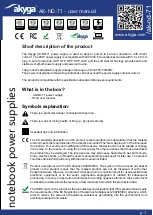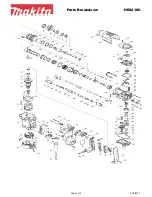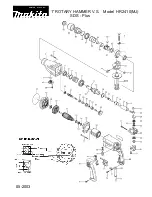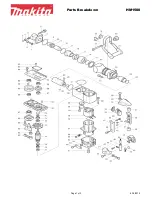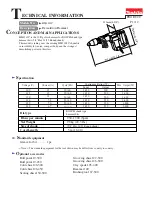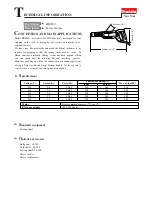
2 — English
GENERAL SAFETY RULES
WARNING!
READ AND UNDERSTAND ALL INSTRUCTIONS.
Fail-
ure to follow all instructions listed below, may result in
electric shock, fire and/or serious personal injury.
WARNING!
When using electric appliances, basic precautions should
always be followed, including the following:
SAVE THESE INSTRUCTIONS
WORK AREA
Keep your work area clean and well lit.
Cluttered
benches and dark areas invite accidents.
Keep bystanders, children, and visitors away while
operating an inflator.
Distractions can cause you to lose
control.
Operate inflator in an open area at least 18 in. away
from any wall or object that could restrict the flow of
fresh air to ventilation openings.
ELECTRICAL SAFETY
To reduce the risk of electrical shock, do not put
inflator in water or other liquid.
Do not place or store
appliance where it can fall or be pulled into a tub or sink.
Use this product only with batteries and chargers
listed in tool/appliance/battery pack/charger correla-
tion supplement 987000-432
.
PERSONAL SAFETY
Stay alert, watch what you are doing and use
common sense when operating an inflator. Do not use
inflator while tired or under the influence of drugs,
alcohol, or medication.
A moment of inattention while
operating inflator may result in serious personal injury.
Dress properly. Do not wear loose clothing or jewelry.
Contain long hair. Keep your hair, clothing, and gloves
away from moving parts.
Loose clothes, jewelry, or long
hair can be caught in moving parts.
Do not overreach. Keep proper footing and balance
at all times.
Proper footing and balance enable better
control of the inflator in unexpected situations.
Use safety equipment. Always wear eye protection.
Dust mask, non-skid safety shoes, hard hat, or hearing
protection must be used for appropriate conditions.
Eye protection is required to guard against flying
fasteners and debris which could cause severe eye
injury.
Do not wear loose clothing or jewelry. Contain long
hair.
Loose clothes, jewelry, or long hair can be drawn
into air vents.
Do not use on a ladder or unstable support.
Stable
footing on a solid surface enables better control of the
inflator in unexpected situations.
Do not disassemble the inflator.
Do not operate inflator near flammable liquids or in
gaseous or explosive atmospheres.
Internal sparks
may ignite fumes.
Do not store your inflator in a damp or wet location.
Do not store in locations where the temperature is less
than 50°F or more than 100°F.
Do not store in outside
sheds or in vehicles.
INFLATOR USE AND CARE
Check hoses for weak or worn condition before each
use, making certain all connections are secure.
Do not
use if defect is found. Purchase a new hose or notify an
authorized service center for examination or repair.
Release all pressures within the system slowly.
Dust
and debris may be harmful.
Do not use inflator if switch does not turn it on or off.
An inflator that cannot be controlled with the switch is
dangerous and must be repaired.
Place the switch off position before making any ad-
justments, changing accessories, or storing the infla-
tor.
Such preventive safety measures reduce the risk of
starting the inflator accidentally.
Store idle inflators out of reach of children and other
untrained persons.
Inflators are dangerous in the hands
of untrained users.
Check for misalignment or binding of moving parts,
breakage of parts, and any other condition that may
affect the inflator’s operation. If damaged, have the
inflator serviced before using.
Many accidents are
caused by poorly maintained tools.
Use only accessories that are recommended by the
manufacturer for your model.
Accessories that may be
suitable for one inflator may create a risk of injury when
used on another inflator.
Keep the inflator and its handle dry, clean and free
from oil and grease.
Always use a clean cloth when
cleaning. Never use brake fluids, gasoline, petroleum-
based products, or any strong solvents to clean your
inflator. Following this rule will reduce the risk of loss of
control and deterioration of the enclosure plastic.
Never point any inflator toward yourself or others.
Keep the exterior of the inflator dry, clean, and free
from oil and grease.
Always use a clean cloth when
cleaning. Never use brake fluids, gasoline, petroleum-
based products, or any strong solvents to clean the unit.
Following this rule will reduce the risk of deterioration of
the enclosure plastic.
Do not exceed the pressure rating of any component
in the system.
Protect material lines and air lines from damage or
puncture.
Keep hose and power cord away from sharp
objects, chemical spills, oil, solvents, and wet floors.



















